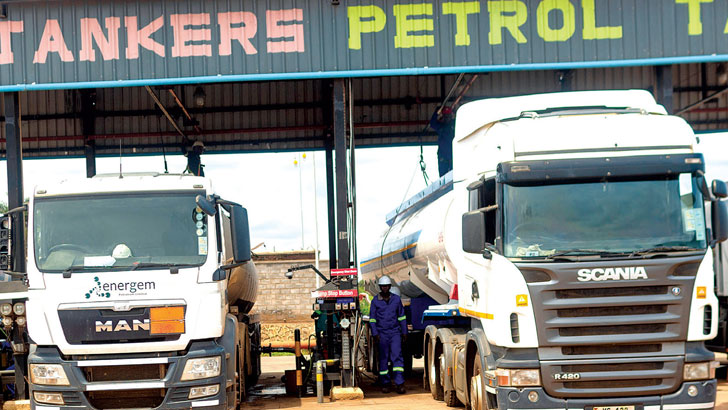Over a year after National Oil Company of Malawi (Nocma) chief executive officer (CEO) Gift Dulla was suspended following arrest for alleged abuse of office, the organisation is yet to conclude his case.
But governance experts have warned that delaying to conduct disciplinary hearings on suspended members of staff can be costly to the taxpayer when the aggrieved officers seek compensation.
Tankers load fuel at a Nocma depot
Fiscal Police arrested Dulla on September 18 2020 for alleged abuse of office before police granted him bail. On October 29 2020 Nocma Board suspended Dulla alongside director of finance Richard Milanzi for 14 days for alleged financial and procurement irregularities.
While Milanzi’s contract expired on May 31 2021, before Nocma Board cleared him or found him of any wrongdoing on the issues regarding the suspension, Dulla has been on suspension since October 29 2020.
In a telephone interview, Milanzi confirmed that his contract was not renewed and that issues surrounding his suspension were also not resolved. He could not be drawn to comment on what action he may take further.
Thindwa: There is need to change our laws
On the other hand, Dulla only appeared for a hearing before the Appointment, Remuneration and Disciplinary Committee of Nocma Board over a year later—on October 29 2021—according to documents we have seen.
Complaints against Dulla, as per a disciplinary hearing letter signed by the committee’s chair person Neil Nyirongo, include gross negligence in performance of duties, wilfully neglecting or failing to perform ones work carefully and properly as well as breach of company’s rules or operational procedures.
But four months after the hearing, Dulla is yet to be informed of the outcome of the hearing.
In an interview this week, Dulla whose contract as CEO ends on March 10 2022, confirmed the Nocma Board is yet to communicate to him the outcome of the hearing.
Dulla, who did not disclose his next move, said he is still on police bail and is anxiously waiting for the matter to be resolved.
“I am sure something is being done about this issue because 2020 is a long time and if I did anything wrong, then the police will have to produce that evidence or else clear me. The only inconvenience on my part is that Nocma took my official vehicle,” he said.
Nocma Board chairperson Zanga-Zanga Chikhosi, who is also Secretary to the President and Cabinet (SPC) did not respond when contacted on delays to hold the disciplinary hearing and why the board has not resolved issues surrounding Dulla’s.
National Police spokesperson James Kadadzera in an interview this week promised to consult Fiscal Police on the latest developments but did not do so by press time.
Governance expert Mustafa Hussein said in an interview the developments demonstrate administrative inefficiencies at the parastatal and pointed out that the organisation is flouting labour practices which may be costly to government when the aggrieved people seek compensation.
“Nocma Board ought to have handled these issues better and in a timely manner because the people are justified to seek redress through the justice system and it is the taxpayer who foots such bills.”
Another governance expert Ernest Thindwa also faulted the Nocma Board for failing to hold disciplinary hearings within the prescribed period as stipulated in labour laws.
Thindwa observed that Nocma should have heard the disciplinary hearings and resolved the issues for the two officers between 21 days to 30 days after their suspension.
He pointed out that because of so much political interest in top positions in parastatals, issues involving executives may continue to be mishandled but at the expense of taxpayers paying hugely in compensations.
“Unless people who make such wrong decisions are personally liable for the compensations that government is made to pay eventually, such trends may continue. There is need to change our laws to start punishing people who are contributing to such mess.”
The post Nocma in costly tactics appeared first on The Nation Online.
 Moni Malawi
Moni Malawi 

